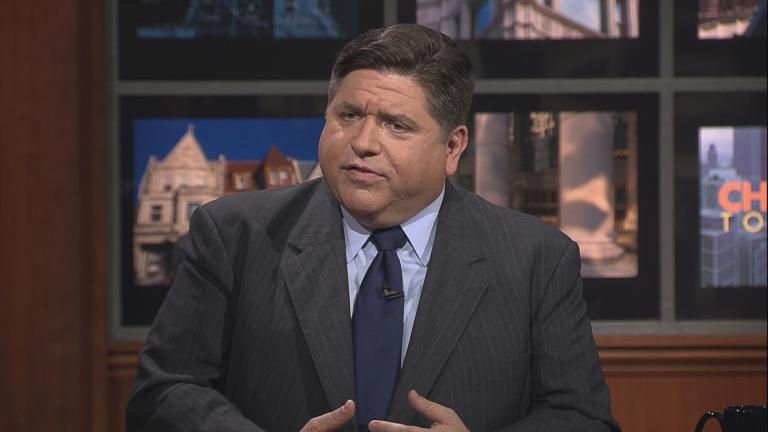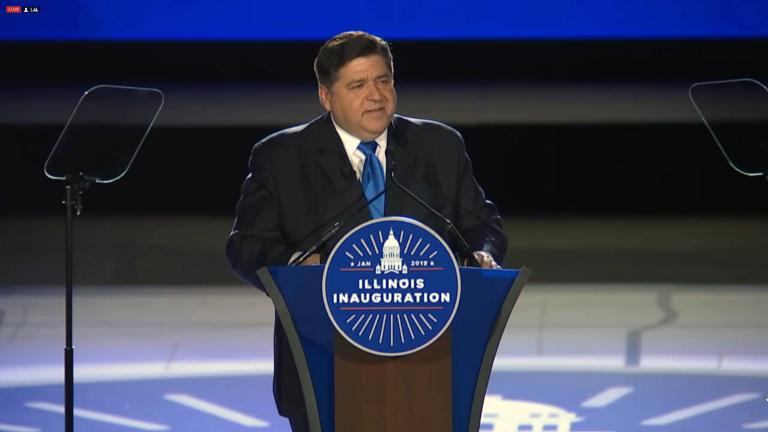Fresh off a double-digit victory in the race for Illinois governor, Democrat J.B. Pritzker on Wednesday appeared to back away from a previously-endorsed plan that would inch the state toward his long-term vision for linking tax rates to residents’ means.
Moving Illinois’ flat-rate income tax to a graduated structure, in which a sliding scale of tax brackets is based on a taxpayer’s income level, was a central to Pritzker’s platform.
“People in the middle class and those striving to get there should get a tax break,” Pritkzer said in an October debate. “And those at the very top … we ought to ask people like Gov. Rauner and me and the wealthiest people in the state to pay more.”
Such a change is years away. It requires asking first legislators, then voters to amend the Illinois constitution; the earliest possible opportunity for that would be in the 2020 election cycle.
In the meantime, Pritzker previous said Illinois could “do what other states have done with a flat income tax and that is to put exemptions in place, to raise the overall rate, but protect the middle class and those striving to get there with those exemptions and then increase the earned income tax credit.”
“That has the effect of a progressive income tax, but frankly it’s very temporary, so that’s why we have to go after immediately,” Pritkzer said on “Chicago Tonight” in January.
But he appeared to reverse course in a one-on-one interview Wednesday.
“That’s not something I’m looking at currently,” he said.
As during the campaign when he was repeatedly asked for specifics about potential tax rates, Pritkzer declined to give details on the longer-term vision for a graduated tax structure.
“Instead I think we’ll focus on what it takes to balance a budget right away,” he said when asked when he’ll introduce a proposal. “We’ve got to work with the legislature and listen to people. Because we’ve got to get 60 percent of the House and the Senate to support a constitutional amendment and then 60 percent of the people of the state to vote for it. And so in order for that to happen we need to make sure that all the ideas are incorporated here. Including the ideas of Republicans.”
Pritzker reinforced his support for other, less significant “near-term” revenue streams, including legalizing (and taxing) marijuana, sports betting and expanding “gaming” (although at a WTTW forum on March 14, Pritzker said he would not support a casino in Chicago; at the same forum he said he would not support a higher tax on gasoline but that he would sell the James R. Thompson Center).
“We’re going to look at everything because balancing the budget is critically important if we’re going to address the real challenges that we’ve got,” he said.
Answers could come soon; Pritzker’s inauguration ceremony is scheduled for Jan. 14.
He’ll have to present a budget proposal in February.
“The very first thing we’ve got to do is get to work on a budget. We’ve got to make sure that we’re establishing the priorities for the state. A budget is a moral document that expresses who we are as a state so we’re going to make sure we’re putting that forward nearly right away. We also want to make sure we’re dealing with the structural deficit. And addressing the challenge of paying the bills of the state. These are all things I think we haven’t seen done over the last number of years.”
Funding infrastructure is also high on his agenda.
“It’s bene a long time since we’ve put money into our roads and bridges and waterways. And frankly we need a broader infrastructure plan too which is building out broadband internet everywhere in the state. And so we want to get at the issue of an infrastructure bill nearly right away in our administration and we’re going to have to work together to get it done.”
There are a lot of ways to pay for an infrastructure program, he said, citing expanded gambling as one option.
Pritzker said some of his plans will help bring down Illinois’ expenses in the long term, such as universal preschool for 3- and 4-year-olds, which he said will improve their reading scores and graduation rates, leading to eventual job growth and lower rates of incarceration.
The governor-elect repeatedly emphasized ending the “partisan rancor” that has epitomized Springfield the past few years, and said he has spoken with each of the four legislative leaders.
Democrats saw their numbers swell on Tuesday, such that Pritzker’s party will hold veto-proof supermajorities in both the House and Senate.
Campaign manager Anne Caprara will be tasked with helping Pritzker to maneuver the reins of government once he’s sworn into his first-ever elected office; Pritzker on Wednesday announced Caprara as his chief of staff.
Caprara has served as chief of staff for members of Congress from Colorado and Ohio.
She has no experience in Illinois government.
Pritzker’s running mate, Juliana Stratton, is poised to be the nation’s first African-American lieutenant governor. She’ll lead the transition team.
“J.B. and I have always prioritized making sure that we have an inclusive and diverse administration,” Stratton said. “We look forward to our administration representing the people of the state of Illinois.”
Co-chairs include former Republican Gov. Jim Edgar, AFL-CIO union leader Michael Carrigan and Obama Foundation Chairman Marty Nesbitt.
Advisors to the transition team include former Illinois Comptroller Dan Hynes, Grosvenor Capital CEO and Mayor Rahm Emanuel confidant Michael Sacks, and state Rep. Christian Mitchell of Chicago who is currently serving as interim director of the Democratic Party of Illinois.
Follow Amanda Vinicky on Twitter: @AmandaVinicky
Related stories:
J.B. Pritzker Defeats Gov. Bruce Rauner in Race for Illinois Governor
City of Chicago and Cook County See Surge in Voting








